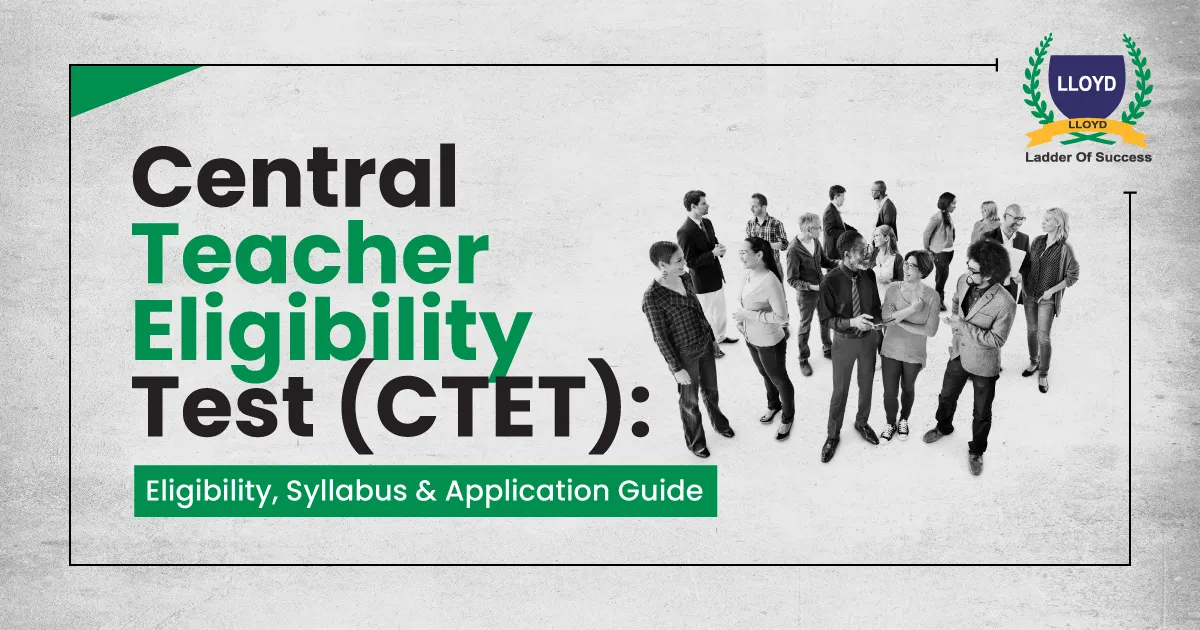
Teaching is one of the most respected and impactful professions in India. With the rising demand for qualified educators, the Central Teacher Eligibility Test (CTET) has emerged as a mandatory requirement for aspiring teachers in government and private schools. Whether you're pursuing your Bachelor of Education (B.Ed.) or exploring the list of TET exams in India, CTET is your gateway to teaching roles in central government schools.
The Central Teacher Eligibility Test (CTET) is a national-level entrance exam conducted by the Central Board of Secondary Education (CBSE). It serves as a benchmark to determine the eligibility of candidates aspiring to become teachers for classes I to VIII in central government schools and institutions. Introduced in accordance with the provisions of the Right of Children to Free and Compulsory Education (RTE) Act, 2009, the CTET ensures that only qualified and competent individuals are entrusted with the responsibility of shaping young minds.
The examination is held twice a year and is one of the most recognizedTeacher Eligibility Tests (TET) in India. It consists of two papers: Paper I, which is for candidates aspiring to teach classes I to V, and Paper II, which is for those intending to teach classes VI to VIII. A candidate may appear for either one or both papers depending on their teaching interests and qualifications.
CTET is not just an examination but a crucial credential for teaching aspirants across the country. The significance of qualifying CTET extends beyond the certificate—it opens the door to employment opportunities in prestigious educational institutions such as:
Moreover, an increasing number of private schools now recognize CTET scores during recruitment, making it equally valuable for those looking to enter the private education sector.
Clearing CTET is also vital for those considering Government Jobs After B.Ed, as it is often a mandatory requirement for teaching roles in public sector schools. Additionally, candidates preparing for state-level TETs or exploring the List of TET Exams in India often treat CTET as a foundational step that builds subject knowledge, teaching methodology, and confidence.
Besides qualifying candidates for teaching jobs, the exam also sets a minimum benchmark of teaching aptitude, understanding of child pedagogy, and subject mastery, ensuring that quality education is provided in classrooms across India.
With the growing focus on educational reform and national standardization of teacher qualifications, CTET has become increasingly important. Whether you're a graduate pursuing teacher training or enrolled in a program at one of the Top Private B.Ed. Colleges in Delhi NCR, preparing for and clearing CTET is essential for building a strong career in education.
If you're targeting CTET 2025, here are some key highlights to keep in mind:
Tentative Dates for CTET July 2025:
|
Event |
Tentative Date |
|
Notification Release |
April 2025 |
|
Application Start |
April 2025 |
|
Last Date to Apply |
May 2025 |
|
Admit Card Download |
June 2025 |
|
Exam Date |
July 2025 |
|
Result Declaration |
August 2025 |
To stay updated, visit the official CTET website.
Eligibility for CTET depends on which paper you intend to appear for:
Paper I (For Classes I to V)
Paper II (For Classes VI to VIII)
If you're studying at any of the top private B.Ed. colleges in Delhi NCR, your institution may guide you through CTET eligibility during your final year.
Applying for CTET is straightforward. Here's a quick step-by-step guide:
|
Category |
Paper I or II |
Both Papers |
|
General/OBC |
₹1000 |
₹1200 |
|
SC/ST/Differently Abled |
₹500 |
₹600 |
Pro Tip: Apply early to avoid last-minute server issues.
The CTET syllabus checks both teaching aptitude and subject knowledge.
Paper I (Classes I–V)
Paper II (Classes VI–VIII)
Understanding this structure is important when deciding how to prepare for government teaching jobs in India.
Earlier valid for 7 years, the CTET certificate is now valid for a lifetime. This is a game-changer for educators aiming for long-term teaching careers.
With a CTET certificate, candidates can:
CTET is a key credential for anyone looking to build a solid career after B.Ed.
Candidates must score at least 60% (90/150 marks) to qualify. For reserved categories, the cutoff may be relaxed to 55%.
How Results Work:
Achieving the CTET credential is often the first step to unlocking government jobs after B.Ed.
Can I appear for both Paper I and Paper II?
Yes. Many candidates attempt both to
increase their eligibility from Classes I–VIII.
What is the mode of the CTET exam?
As of 2021, CTET is conducted in Computer-Based Test
(CBT) format.
Do I need coaching to clear CTET?
Not necessarily. However, joining preparatory classes
or studying with support from your B.Ed. college can boost your success rate.
Which books are best for CTET preparation?
Can CTET help in getting state government jobs?
While not mandatory in all states, many
states recognize CTET or accept it as part of their eligibility criteria.
If you're passionate about teaching and are pursuing a Bachelor of Education, the CTET exam is essential to access both public and private teaching roles. It's a recognized benchmark of quality that aligns with the national education policy.
Preparing for CTET also aligns perfectly with those wondering how to prepare for government teaching jobs, especially if you plan to apply for central schools or top state-level positions, make CTET your priority for 2025.